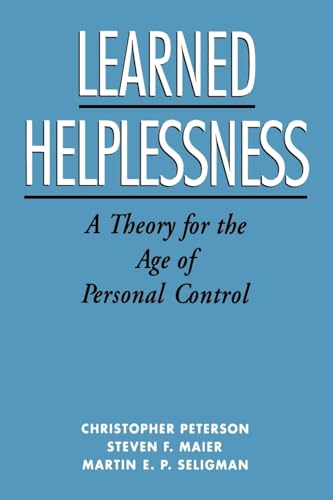Learned Helplessness
A Theory for the Age of Personal Control
Christopher Peterson
BOOK REVIEW

In an era where personal control is touted as the path to success and happiness, Learned Helplessness: A Theory for the Age of Personal Control disrupts this narrative with a chilling exploration of vulnerability and the psychological shackles of inaction. Christopher Peterson, a name synonymous with positive psychology, unearths this profound concept, compelling us to confront our inherent limitations and reconsider how we interpret failure and success in a world that demands unyielding self-efficacy.
By delving into the crux of learned helplessness, Peterson awakens within us a visceral understanding of despair. This sensation is all too familiar to many: when faced with repeated setbacks, we often become paralyzed, engulfed in a fog of pessimism, believing that our efforts are in vain. The insights from the experimental realms of psychology, showcased throughout this tome, paint a vivid image of how external forces can overpower our will to act. Peterson doesn't merely present a theory; he evokes a haunting narrative that resonates deeply, encouraging readers to reflect on their own lived experiences.
This lack of control is particularly unsettling, especially in a society that pushes the mantra of self-determination. The book's profound implications stretch far beyond academic borders, impacting everything from education to mental health. Consider how this theory offers a powerful lens through which we can interpret the challenges faced by countless individuals daily-be it students overwhelmed by academic pressures or employees stifled in toxic workplaces. Peterson's insights demand that we look beyond personal responsibility and assess the broader systemic barriers shaping human behavior.
Readers' reactions to the book are as diverse and intense as the themes it tackles. Some laud Peterson for shedding light on such a critical aspect of human psychology, emphasizing how learned helplessness can manifest in numerous arenas of life-from the classroom to corporate offices. They find empowerment in understanding their responses and the roots of their frustrations. Others, however, critique the book for its seemingly bleak outlook, arguing that it may inadvertently foster a sense of complacency in readers who believe they are trapped by circumstances. This duality is precisely what makes Peterson's work an essential read; it confronts us with uncomfortable truths while simultaneously offering pathways to reclaim agency.
What's particularly fascinating about Peterson's exploration is how it juxtaposes our innate drive for control against the realities of psychological trauma and societal constraints. As we navigate this narrative, one can't help but be drawn into a deeper conversation about resilience and the human spirit. The stark contrast between those who thrive and those who remain immobilized offers a rich tapestry of inquiry: what separates individuals who adapt and those who succumb? And how much of this is influenced not solely by personal choice but by the relentless tides of circumstance?
The narrative of learned helplessness forces an introspective journey, urging you to scrutinize your own moments of defeat. Have you ever felt stuck, believing that no matter how hard you try, the outcomes will never change? The emotional weight of such realizations can be staggering, striking you with the force of a revelation. This is where Peterson excels, striking the delicate balance between scientific rigor and profound empathy.
In closing, Learned Helplessness serves not only as an academic resource but also as a mirror reflecting the complexities of the human psyche. It provokes a soul-searching inquiry into how we respond to life's adversities, daring us to reclaim our narrative. And while the shadows of hopelessness loom large, the potential for change resides within the very understanding that Peterson so eloquently articulates. As you turn the pages, expect to be challenged, shaken, and ultimately transformed. Buckle up; this isn't just a read; it's a journey into the depths of your own consciousness, a reckoning that could change everything. ✨️
📖 Learned Helplessness: A Theory for the Age of Personal Control
✍ by Christopher Peterson
🧾 376 pages
1995
#learned #helplessness #theory #personal #control #christopher #peterson #ChristopherPeterson